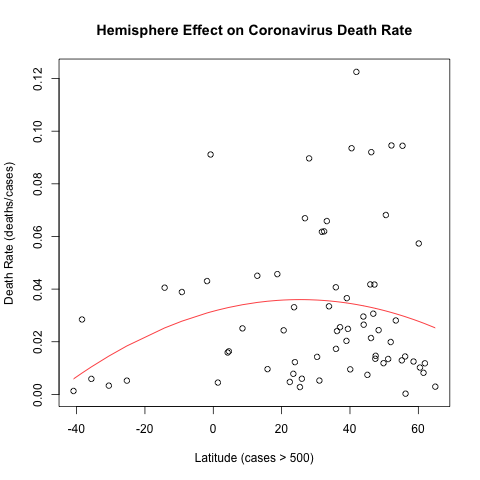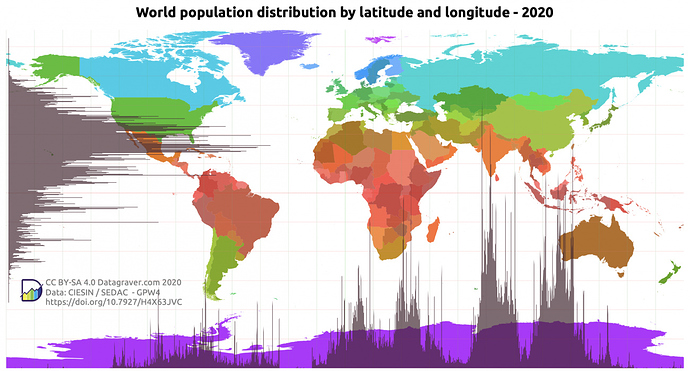As I was googling who our visitor @EricMH was, I came upon his article here that I would like to discuss with folks:
But, is it really a global pandemic? If you’ve been watching the news, you might notice that some areas of the world are oddly absent from the reporting.
This is true. I live in Southern Mexico. The only way I can get COVID-19 news about the place where I live is informal Facebook and WhatsApp reports. The reason? No one pays reporters to report on things here. If you want to know what is going on, you have to tune into the mayor’s Facebook live press conference and know people who are in the know.
Is COVID-19 vulnerable to heat? It is worth asking whether that explains the lower mortality rate near the equator and in the southern hemisphere. At any rate, given how little we know about COVID-19, we should acknowledge the unknown unknowns before drawing firm conclusions on the subject.
I know development workers all over the world and in most developing countries, nobody trusts the government’s official stats. My friends in Africa and India are saying similar things to what I am saying here. In most places in Mexico, you cannot get an official test unless your symptoms merit hospitalization. Private doctors who have obtained their own tests and are testing patients say the government won’t include those positive tests in the official counts because they weren’t done at official hospitals.
There are five official reported cases and one death in the town of 6,000 where I am right now. But one of my colleagues has been home sick with COVID for a month now. She cannot get a test because she can still breathe. I know of about ten people who are sick right now, presumably with the virus, and no one has been counted because they haven’t been tested. (Just like Trump says, if you don’t test, you have fewer cases!)
I am evacuated from the place where I normally work because it is unstable and run by drug cartels. Things are much worse there, but people refuse to go to the hospital because if you test positive, you can’t have a normal funeral, which is a fate worse than death for many people. Hundreds of people in the city where it has been 90-100F for the last two months are officially sick.
The social distancing lockdown has been far stricter here than many places in the US. No one is allowed into the town where we are who doesn’t live here or have an official pass like the FedEX and DHL guys. But my husband had to meet the UPS delivery guy on the outskirts of town to get our replacement credit card because he didn’t have his stuff in order to come into the town. All cars are stopped going in and out for temperature checks and to have the interiors sprayed with disinfectant (not sure what good that does, other than psychologically impress upon people that we are in a crisis.) Masks are required in all public spaces and only one person per family is allowed in stores. In Walmart in the state capital, all the aisles deemed non-essential merchandise have been roped off for months. I went to Office Depot to buy art supplies for my daughter taking a summer online class and I had to tell a police officer what I wanted and once it was deemed essential enough, an employee escorted me to the aisle and the cash register. Only one customer was allowed in the store at a time. Everything but grocery, pharmacy, and takeout has been closed since late March. My kids’ orthodontist meets us in the parking garage and opens up the office to keep my kids braces on track. I think this might not be totally legit because he won’t even turn the lights on in the front of the office that is visible to the shopping mall security. People are definitely still getting infected. It is definitely a real pandemic.
All this to say that the conclusions about COVID-19s effect on the global South are only as good as the data and I suspect the data coming out of the majority world is mostly garbage and shouldn’t be used to draw any conclusions about whether the virus spreads in hot climates. Looks like it’s doing just fine despite pretty draconian efforts to stem the tide.
The one thing that I think may be different in poorer, warmer countries is that there is no climate control. The virus spread like crazy in NY, and the Midwest when it was cold and people were indoors with circulated air. It is now spreading like crazy in Texas, Florida, and Arizona where it is really hot and people are in AC with circulated air. Here most public gathering spaces are not enclosed like that, and are essentially outdoors. Many churches and markets and eating places are outside under canopies or in wall-less structures called palapas, not in enclosed buildings, and the enclosed buildings don’t have ventilation systems circulating the air; they have open windows. Whatever advantage this gives the countries is probably offset by the number of people who rely on crowded public transport systems. Public transportation has been significantly restricted here, with temperature checks, and mandatory masks and maximum occupancy at 1/3. In a one hour trip into the capital you will be stopped at three police checkpoints.


